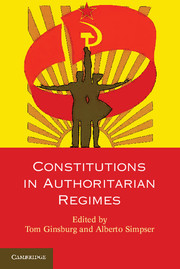Book contents
- Frontmatter
- Contents
- List of Contributors
- 1 Introduction
- Part I The Category
- 2 Ruling against Rules*
- 3 Authoritarian Constitutionalism
- Part II Constitutional Design in Authoritarian Regimes
- Part III Contents of Authoritarian Constitutions
- Part IV Consequences of Authoritarian Constitutions
- Index
- References
2 - Ruling against Rules*
Published online by Cambridge University Press: 05 June 2014
- Frontmatter
- Contents
- List of Contributors
- 1 Introduction
- Part I The Category
- 2 Ruling against Rules*
- 3 Authoritarian Constitutionalism
- Part II Constitutional Design in Authoritarian Regimes
- Part III Contents of Authoritarian Constitutions
- Part IV Consequences of Authoritarian Constitutions
- Index
- References
Summary
The Polish Constitution of 1952 appears in all substantive aspects to be a constitution of democracy. Most importantly, it does not contain the clause giving the communist party “the leading role in the state,” a clause standard in communist constitutions, beginning with the Soviet one of 1936. This fact is puzzling because Communist Party had a de facto monopoly of power, and exercising de facto power against written rules creates unnecessary difficulties. Indeed, it may not be accidental that the communist rule in Poland was most vulnerable to political crises, including the first breakdown of communist regimes.
A CONSTITUTION
Here are some articles from a constitution:
Article 15.
§1. The highest organ of State power is the Parliament.
§3. The Parliament adopts laws and executes control of activities of other organs of power and public administration.
Article 16.
§3. A deputy to the Parliament cannot be prosecuted or arrested without the consent of the Parliament or, during periods when the Parliament is not in session, of the Council of State.
Article 28a.
§1. The HighestControl Chamber oversees economic, financial, and organizational organs of public administration.
- Type
- Chapter
- Information
- Constitutions in Authoritarian Regimes , pp. 21 - 35Publisher: Cambridge University PressPrint publication year: 2013
References
- 6
- Cited by



